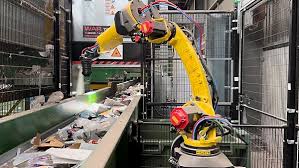
The UK aims to build a truly circular economy, reducing, reusing, and recycling waste (the three Rs) while achieving climate and net-zero goals cost-effectively. A key player in this endeavor is Tetra Pak, a global leader in food and beverage processing, packaging, and distribution.
Tetra Pak is going beyond making cartons that preserve the nutritional value and taste of packaged food; its collaboration with the UK is to revolutionize how those cartons and other valuable materials are recycled with the aid of AI. This move is giving a glimpse into the future where machines adapt, learn, and significantly improve the handling of post-consumer waste.
The Recycling Challenge: A Complex Puzzle
For years, the recycling landscape has faced/has been facing significant hurdles. Major problems faced by (but not restricted to) the UK include:
- Insufficient Processing Capacity
Most countries lack sufficient recycling processing facilities. For instance, in the UK, while the process of waste collection has improved over the years, the infrastructure needed to process and recycle materials cannot keep up with the amount of waste material received.
There was a time when the UK exported large portions of its recyclable waste to other countries, China especially. However, since the 2018 “waste import” ban in China, the UK has been having trouble properly processing their recyclables.
- Contamination of Recyclables
Most households and businesses in the UK don’t properly separate recyclable waste from non-recyclable materials, which leads to contamination. In situations where recyclables get contaminated, they are either sent to landfills or incinerated.
- Plastic Waste Pandemic and Lack of Recycling Markets
According to Statista, the UK produces an annual amount of more than 2 million metric tons of plastic waste annually. While certain types of plastics are recyclable, many types of plastic, like flexible films, black plastic, and certain multi-layer packaging, cannot be processed easily. Hence, most plastic that falls into this category ends up being incinerated or in a landfill.
Also, the market for plastic waste is still underdeveloped, as many manufacturers and businesses prefer newly made plastic to recycled plastic, as it is often cheaper and more durable.
The AI-Powered Revolution with Tetra Pak
In May 2025, Tetra Pak announced its collaboration with a British technology start-up, Recycle, a company that offers AI robotics for waste and material management. The intent of the partnership was to upgrade sorting systems at J&B Recycling’s material recycling facility (MRF) in Hartlepool.
The £1.4 million investment was to enable J&B Recycling to increase sorting of food and beverage cartons for recycling. The upgrade included the installation of two advanced robotic sorting arms known as QualiBot, powered by AI and designed by Recycleye.
The robotic arms make use of Recycleye Vision, an AI computer vision system with the accuracy of the human eye, which identifies individual items on waste streams by visual characteristics, enabling the robot to sort them effectively.
Access to the “WasteNet,” which was created for this project and is now the world’s largest waste database, allows it to sort waste to unprecedented granularity. QuailBot scans, picks, and sorts out Tetra Pak cartons from a mixed stream of waste, boosting a 95% purity rate.
On July 3rd, 2025, Tetra Pak announced a second AI investment that financed the production and installation of innovative AI-powered optical sorting technology known as Recycleye QuantiSort at Cumbria Waste Management’s materials recycling facility (MRF) in Carlisle.
The technology uses AI and cameras to detect beverage cartons within mixed waste streams, and pneumatic (air-powered) valves are then used to eject the identified cartons so they can be sent to a recycling unit. According to Recycleye, the system can be more easily trained to sort out cartons than traditional sorting methods and is achieving over 98% purity of carbon output.
Why AI and Robotics?
Employing the use of Recycleye’s robotics, recycling becomes an error-free and speedy process. The Quailbot, for instance, can pick up to 33,000 items in a 10-hour shift, which is impossible for a single human. Human labor will require rest periods, experience reduced output as the shift progresses, and have limits to the amount of time required for each shift, which implies more labor cost.
Robotics bypasses all these limitations and reduces cost. The AI feature guarantees high accuracy; optical sorting, for instance, allows up to 98% purity of recovered cartons; the system can be easily retrained to identify new designs or packaging materials; and the real-time monitoring system provides analytics for performance insights.
These capabilities will significantly reduce contamination rates and landfill-bound waste, which in turn boosts recycling efficiency and cost savings.
Aligning with UK Policy
Tetra Pak is not just keeping the pace with sustainability goals it is setting a new standard on how a circular economy can be achieved.
In partnership with the Simpler Recycling reform, a UK government program starting on March 31, 2025, Tetra Pak is improving materials recovery facilities (MRFs) to support this policy by making sure they can manage more waste.
Final Thoughts
“Our goal is to create a closed-loop recycling system,” says Alex Henriksen, MD of Tetra Pak East Europe. “This facility is not just about processing waste; it’s about rethinking how we handle packaging at every stage of its life cycle.”
Tetra Pak is not just a packaging company; they are becoming a vital enabler of a smarter and more sustainable future for the UK’s recycling industry. Their bid in the AI-powered revolution is proving that AI technology, when applied strategically, can unlock incredible potential for a clean, smart, and sustainable environment.

